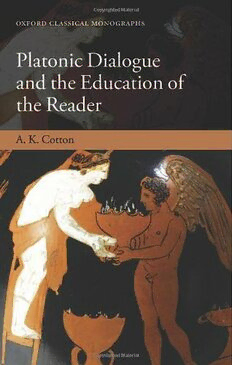
Platonic Dialogue and the Education of the Reader PDF
Preview Platonic Dialogue and the Education of the Reader
OXFORD CLASSICAL MONOGRAPHS Published under the supervision of a Committee of the Faculty of Classics in the University of Oxford OUPCORRECTEDPROOF–FINAL,28/1/2014,SPi The aim of the Oxford Classical Monographs series (which replaces the Oxford Classical and Philosophical Monographs) is to publish booksbasedonthebestthesesonGreekandLatinliterature,ancient history, and ancient philosophy examined by the Faculty Board of Classics. Platonic Dialogue and the Education of the Reader A. K. COTTON 1 3 GreatClarendonStreet,Oxford,OX26DP, UnitedKingdom OxfordUniversityPressisadepartmentoftheUniversityofOxford. ItfurtherstheUniversity’sobjectiveofexcellenceinresearch,scholarship, andeducationbypublishingworldwide.Oxfordisaregisteredtrademarkof OxfordUniversityPressintheUKandincertainothercountries #A.K.Cotton2014 Themoralrightsoftheauthorhavebeenasserted FirstEditionpublishedin2014 Impression:1 Allrightsreserved.Nopartofthispublicationmaybereproduced,storedin aretrievalsystem,ortransmitted,inanyformorbyanymeans,withoutthe priorpermissioninwritingofOxfordUniversityPress,orasexpresslypermitted bylaw,bylicenceorundertermsagreedwiththeappropriatereprographics rightsorganization.Enquiriesconcerningreproductionoutsidethescopeofthe aboveshouldbesenttotheRightsDepartment,OxfordUniversityPress,atthe addressabove Youmustnotcirculatethisworkinanyotherform andyoumustimposethissameconditiononanyacquirer PublishedintheUnitedStatesofAmericabyOxfordUniversityPress 198MadisonAvenue,NewYork,NY10016,UnitedStatesofAmerica BritishLibraryCataloguinginPublicationData Dataavailable ISBN 978–0–19–968405–2 Asprintedandboundby CPIGroup(UK)Ltd,Croydon,CR04YY LinkstothirdpartywebsitesareprovidedbyOxfordingoodfaithand forinformationonly.Oxforddisclaimsanyresponsibilityforthematerials containedinanythirdpartywebsitereferencedinthiswork. Contents Preface vii Abbreviations ix PartI 1. ReadingPlato’sDialogues 3 1.1 Conversingandreading 4 1.2 Readingaslearning 20 1.3 Plato’sdialogues:readorperformed? 29 2. ReadersandInterlocutors 32 2.1 Theprisoner’sascentfromtheCave:aparadigm forlearning 32 2.2 Ademandingtypeofreading 38 2.3 Readersandinterlocutors 44 2.4 Developingagenericidentity 49 2.5 Plato’scorpusandthedevelopmentofthereader 52 3. DevelopingtheVirtuesofDialectic:AModel forReading 58 3.1 ‘Middle’and‘late’ works:aparadigmshift? 58 3.2 Interlocutorsin‘early’dialogues 67 3.3 Interlocutorsin‘middle’dialogues 75 3.4 Interlocutorsin‘late’dialogues 80 3.5 Progressandvirtue 84 3.6 Learningamongreaders 92 PartII 4. Characterization:ARouteintoInterpretation? 101 4.1 SocratesandAlcibiades 101 4.2 Character:arouteintointerpretation? 106 4.3 Charactersasrolemodels? 112 4.4 Character,reflection,andconstruction 116 4.5 Thechallengeofcharacter:afunctionalview 127 4.6 Socrates:adominantcharacter 130 vi Contents 4.7 Characterizationandtheexperienceofreading 132 4.8 ‘Later’dialogues:thedisappearanceofcharacter 135 5. Argumentation:ADescentintoDidacticDialectic? 142 5.1 Authoritiesonwisdom 142 5.2 Adescentintodidacticdialectic? 146 5.3 Possiblesolutions 151 5.4 Analternativeapproach:argumentsand theirpresentation 154 5.5 ‘Early’ arguments 160 5.6 ‘Middle’arguments 168 5.7 ‘Late’arguments 176 5.8 Towardsindependentreadersandlearners 184 6. StructureandUnity:ChallengingtheReader 187 6.1 Searchingforunity 187 6.2 Structureandunity:possibleapproaches 193 6.3 Commonstructuralpatterns 198 6.4 Structuralpatternsandthereader 214 6.5 Structure,unity,and‘living’discourse 217 7. PlotandAction:Processvs.Resolution 225 7.1 Plato’sdialogues:classicalplot? 225 7.2 Unclassicalplot:proliferation,fragmentation, andirresolution 232 7.3 Laches 236 7.4 Republic 242 7.5 Sophist 250 7.6 Resolutionvs.repetition:gettingcaughtinthemiddle 256 8. Reading,Learning,andActing:BecomingActiveReceivers 263 8.1 Thereader’sprogress 263 8.2 Dialecticalvirtue,civicvirtue 270 8.3 ThemythofPhaedo:fromreadingtoacting 277 References 291 GeneralIndex 315 IndexofWorks 327 Preface Ibeginmystudy,inPartI,byexaminingthecharacteroftheresponse the dialogues invite in the reader, with careful attention to Plato’s presentationoftheactivityofinterlocutors,whichItreatasacomplex model for the reader. In Part II, against this background, I offer a series of case studies in how the dialogues engage the reader. In chapter 4, I look at Plato’s use of characterization, and in chapter 5 I consider the structure of individual passages of argumentation. Chapter6 looks at larger-scale structural patterns that affect the shapeofwholedialogues,whilechapter7considersPlato’shandling of plot. In chapter 8, drawing the strands of my study together, IreflectonthevaluePlato’sdialoguesattachtoreadingandonPlato’s engagementwithcivicframeworksandvalues. TherearetwoprincipalreasonsIhavechosenthepresentarrange- ment,bothinformedbytheideathatPlato,inhisdialogues,iscarving outanarenaforaparticulartypeoflearningengagement.First,Iam concerned to show how my approach can be applied to dialogues usually regarded as coming from Plato’s ‘early’, ‘middle’, and ‘late’ periodsofcomposition.Forthisreason,Ihavenotwantedtolimitmy studytoasingledialogueorperiod;andineachchapterIofferbrief readingsofadialogueofeachtype,oratleastindicatehowmyideas might apply to them. Exploring the engagement of the reader in works of these different types allows me to develop a reading of the receiver’s development across the corpus, as well as in individual works,asIexplaininchapter2. Second, I wish to show that my approach can be applied across a rangeoffeaturesofthedialogues,andtoillustratehowthesecomple- menteachotherinthewaystheyengagethereader.Wheninterpret- ers focus on one feature, such as argumentation or characterization, it often remains unclear how others would be amenable to similar treatment. In particular, I am keen to show that my approach accounts for both ‘philosophical’ aspects of the dialogues (primarily argumentation)and ‘literary’ ones.1Traditionally, criticshave found 1 A successful interpretation of the dialogues needs to account for both: while ‘literary’interpretershavecriticizedtraditionalcommentatorsforfocusingexclusively viii Preface itdifficulttoshowhowtheseworktogether,sometimessuggesting,to putitcrudely,thattheyengagethe‘intellect’and‘emotions’respect- ively.Suchaview,asIdiscussinmoredetaillater,isunattractivefora varietyofreasons,notleastbecauseitseemstomakePlato’sviewson poetryatoddswithhisownliterarypractice;anditisnowcommonly recognizedasoverlysimplistic.Indeed,thejuxtapositionof‘intellect’ and‘emotion’isitselfincreasinglybeingdisputed.2However,thisstill leaves us with the challenge of offering a satisfying account of the different aspects of the dialogues, in which both play a valuable role inengagingthe readerbut theirobviousdifferences arenot ignored. The approach I develop in this study, based on the idea that Plato’s dialogues invite a distinctive type of engagement in the reader, will, Ihope,offeraplausiblewayofdoingthis. Twoalternativestothepresentstructurewouldhavebeentooffera studyofasingletopicacrossthedialoguesortoundertakeastudyofa singledialogue.Bothoftheseofferscopeformoreextendedanalysis thanmypresentarrangement;and,bywayofcompromise,thereisa coregroupofdialoguestowhichIregularlyreturn,includingRepublic, Phaedrus,andSophist,thoughIalsodrawonawiderselectionofworks toprovidecontextformyarguments. My thanks go to all those who have helped shape this study or supported me during its development, and in particular: my family; TobiasReinhardt,whosupervisedmyD.Phil.thesis;TimRood,who oversaw its transformation into its present shape; Richard Ruther- ford;LesleyBrown;mycolleaguesatMagdalenCollegeSchool,andin particulartheMaster,DrTimHands. on argumentation, the opposite charge is now being thrown back against them. See e.g. the critique of Gordon in Benson (2003). For the parallel problem of the relationshipbetweenpoetryandphilosophy,intellectandemotion,inLucretius,see Gale(1994)1,Volk(2002)72–3,95ff. 2 Seee.g.Nussbaum(2001). Abbreviations AbbreviatedtitlesforworksofPlato: Ap. Apology Chrm. Charmides Euthd. Euthydemus Euthphr. Euthyphro G.Hp. GreaterHippias Grg. Gorgias Lch. Laches Ly. Lysis M. Meno Phd. Phaedo Phdr. Phaedrus Phlb. Philebus Plt. Politicus Prm. Parmenides Prt. Protagoras R. Republic Smp. Symposium Sph. Sophist Tht. Theaetetus AbbreviatedtitlesforworksofAristotle: Soph.El. SophisticalRefutations Top. Topics Othertitlesaregiveninfull.
